Перевод и анализ слов искусственным интеллектом ChatGPT
На этой странице Вы можете получить подробный анализ слова или словосочетания, произведенный с помощью лучшей на сегодняшний день технологии искусственного интеллекта:
- как употребляется слово
- частота употребления
- используется оно чаще в устной или письменной речи
- варианты перевода слова
- примеры употребления (несколько фраз с переводом)
- этимология
elementary proposition - перевод на русский
логика
элементарное высказывание
математика
атомарное высказывание
математика
атомарное предложение
математика
элементарное высказывание
математика
гиперэлементарная группа
математика
логическое высказывание
общая лексика
элементарная частица
математика
элементарная группа
Определение
Википедия
In logic and analytic philosophy, an atomic sentence is a type of declarative sentence which is either true or false (may also be referred to as a proposition, statement or truthbearer) and which cannot be broken down into other simpler sentences. For example, "The dog ran" is an atomic sentence in natural language, whereas "The dog ran and the cat hid" is a molecular sentence in natural language.
From a logical analysis point of view, the truth or falsity of sentences in general is determined by only two things: the logical form of the sentence and the truth or falsity of its simple sentences. This is to say, for example, that the truth of the sentence "John is Greek and John is happy" is a function of the meaning of "and", and the truth values of the atomic sentences "John is Greek" and "John is happy". However, the truth or falsity of an atomic sentence is not a matter that is within the scope of logic itself, but rather whatever art or science the content of the atomic sentence happens to be talking about.
Logic has developed artificial languages, for example sentential calculus and predicate calculus, partly with the purpose of revealing the underlying logic of natural-language statements, the surface grammar of which may conceal the underlying logical structure. In these artificial languages an atomic sentence is a string of symbols which can represent an elementary sentence in a natural language, and it can be defined as follows. In a formal language, a well-formed formula (or wff) is a string of symbols constituted in accordance with the rules of syntax of the language. A term is a variable, an individual constant or an n-place function letter followed by n terms. An atomic formula is a wff consisting of either a sentential letter or an n-place predicate letter followed by n terms. A sentence is a wff in which any variables are bound. An atomic sentence is an atomic formula containing no variables. It follows that an atomic sentence contains no logical connectives, variables, or quantifiers. A sentence consisting of one or more sentences and a logical connective is a compound (or molecular) sentence.

